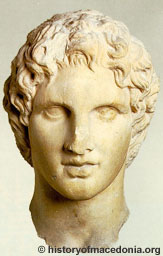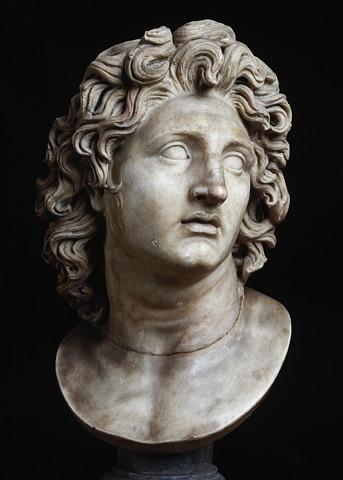 Alexander the Great, who would become the Conqueror of the Ancient World, was born at Pella which was the captal matedoeian, he was born 356 B.C. His father was King Phillip II and his mother was Olympias and he died 323 B.C. but before that When he was 13, Alexander became student to the great Greek philosopher Aristotle. Under Aristotle's tutorship he gained an interest in philosophy, medicine and science. However, Aristotle's concept of small city-state government would not have gone down well with the young prince who was bent on world domination. Aristotle did, however, cultivate Alexander's interest in reading and learning.At age 16 Alexander was called to Macedonia to put down a Thracian rebellion while his father was away. Distinguishing himself immediately, Alexander quelled the rebellion, stormed the rebel's stronghold and renamed it Alexandroupolis, after himself.
Alexander the Great, who would become the Conqueror of the Ancient World, was born at Pella which was the captal matedoeian, he was born 356 B.C. His father was King Phillip II and his mother was Olympias and he died 323 B.C. but before that When he was 13, Alexander became student to the great Greek philosopher Aristotle. Under Aristotle's tutorship he gained an interest in philosophy, medicine and science. However, Aristotle's concept of small city-state government would not have gone down well with the young prince who was bent on world domination. Aristotle did, however, cultivate Alexander's interest in reading and learning.At age 16 Alexander was called to Macedonia to put down a Thracian rebellion while his father was away. Distinguishing himself immediately, Alexander quelled the rebellion, stormed the rebel's stronghold and renamed it Alexandroupolis, after himself.
In 336 B.C.E. Phillip was assassinated and 20 year old Alexander took the throne of Macedonia. Within two years he had embarked on his campaign of conquest. His army of 30,000 foot soldiers and 5,000 cavalreymen was small but efficient. Along with the army he took engineers, surveyors, architects, scientists and even historians.
 Alexander now pushed further south, conquering Gaza and then moving into Egypt where the people welcomed him as a deliverer from their Persian rulers. Now Alexander turned north east, moving through Palestine towards the Tigris River. In 331 B.C.E. he met the Persians for the third time. The Battle of Gaugamela saw him defeat superior odds once more. Persian King Darius was later killed by his own people. Swiftly Alexander pushed through to take the Persian Capital at Babylon. He humiliated the Persians by burning their great palace at Xerxes. Before long the entire Persian domain was under Alexander's control. He now crossed the Indus River and entered the region bordering the Persian province of Taxila. Here he met the feared Indian Monarch Porus who, with 25,000 men and 200 elephants nearly did what the entire Persian Kingdom could not. After fierce fighting, however, Alexander was once more victorious. Porus surrendered and became an ally.
Alexander now pushed further south, conquering Gaza and then moving into Egypt where the people welcomed him as a deliverer from their Persian rulers. Now Alexander turned north east, moving through Palestine towards the Tigris River. In 331 B.C.E. he met the Persians for the third time. The Battle of Gaugamela saw him defeat superior odds once more. Persian King Darius was later killed by his own people. Swiftly Alexander pushed through to take the Persian Capital at Babylon. He humiliated the Persians by burning their great palace at Xerxes. Before long the entire Persian domain was under Alexander's control. He now crossed the Indus River and entered the region bordering the Persian province of Taxila. Here he met the feared Indian Monarch Porus who, with 25,000 men and 200 elephants nearly did what the entire Persian Kingdom could not. After fierce fighting, however, Alexander was once more victorious. Porus surrendered and became an ally.
In the summer of 336 B.C.E. at the ancient Macedonian capital of Aegai, Alexander's sister married her uncle Alexander. During this event Philip was assassinated by a young Macedonian noble, Pausanias. After his father's death Alexander sought the approval of the Macedonian army for his bid for kingship. The generals agreed and proclaimed him king, making Alexander the ruler of Macedon. In order to secure his throne, Alexander then killed everyone who could have a possible claim to the kingship.
Although he was the king of Macedon, Alexander did not automatically gain control of the Corinthian League. Some Greek states rejoiced at Philip's murder, and Athens wanted to rule the League. Throughout Greece independence movements arose. Immediately Alexander led his armies to Greece to stop these movements. The Greek states quickly recognized him as their leader, while Sparta still refused to join. The League gave Alexander unlimited military powers to attack Persia, a large kingdom to the east of Greece.Alexander then pushed on into Egypt. Egypt fell to Alexander without resistance, and the Egyptians hailed him as their deliverer from Persian domination. In every country, Alexander respected the local customs, religions, and citizens. In Egypt he sacrificed to the local gods and the Egyptian priesthood recognized him as pharaoh, or ruler of ancient Egypt. They hailed Alexander as a god. Alexander then worked to bring Greek culture to Egypt. In 331 B.C.E. he founded the city of Alexandria, which became a center of Greek culture and commerce.
In September 331 B.C.E. Alexander defeated the Persians at the Battle of Gaugamela. The Persian army collapsed, and again Darius fled. Instead of chasing after him, Alexander explored Babylonia, which was the region that Darius had abandoned. The land had rich farmlands, palaces, and treasures. Alexander became "King of Babylon, King of Asia, King of the Four Quarters of the World."
Alexander next set out for Persepolis, the capital of the Persian Empire. To prevent an uprising, Alexander burned Persepolis. In the spring of 330 he marched to Darius's last capital, Ecbatana (modern Hamadan). There Alexander set off in pursuit of Darius.
By the time Alexander caught up with Darius in July 330, Darius's assistants had assassinated him. Alexander ordered a royal funeral with honors for his enemy. As Darius's successor, Alexander captured the assassins and punished them according to Persian law. Alexander was now the king of Persia, and he began to wear Persian royal clothing. As elsewhere, Alexander respected the local customs
In the spring of 323 B.C.E. Alexander moved to Babylon and made plans to explore the Caspian Sea and Arabia and then to conquer northern Africa. On June 2 he fell ill, and he died eleven days later.
Alexander's empire had been a vast territory ruled by the king and his assistants. The empire fell apart at his death. The Greek culture that Alexander introduced in the East had barely developed. In time, however, the Persian and Greek cultures blended and prospered as a result of his rule.
Read more: Alexander the Great Biography - family, children, parents, death, history, wife, mother, young, son http://www.notablebiographies.com/A-An/Alexander-the-Great.html#ixzz1t9q84Lr6